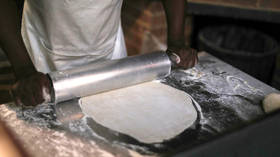The white chef must fall! How the culture warriors are now weaponising and racialising food

When the possession of a white skin – and therefore white privilege – is treated as a form of original sin, anyone can become a target. You don’t need to say anything offensive; your very existence can be perceived as an offence.
Calls for John Edge to step down as head of the Southern Foodways Alliance in America show that even the most “spotless” white man risks becoming a statue that “must fall.”
None of Edge’s critics claim that he is racist or that he has done anything wrong. In fact, Edge has been lauded for helping to raise the profile of African-American cooks and for leading a campaign to help rebuild a black-owned New Orleans restaurant after Hurricane Katrina.
No, the reason for calling on Edge to step aside is simply that he is a white man.
Also on rt.com Nestle’s Red Skins & Chicos to be renamed in latest corporate wokeness virtue signalling effortEdge, and the organisation that he has led for over 20 years, has played an important role in popularising southern food in the US. His opponents argue that he has too much influence over who tells the story of a region whose cuisine has been influenced by black people.
Food, like everything else in contemporary culture, has become thoroughly racialised and weaponised. White chefs and cookbook authors face being toppled over for supposedly dispossessing ethnic groups of their culinary culture. They are charged with the crime of cultural appropriation.
The most recent target of the crusade against cultural appropriation is the popular vegan cooking website Thug Kitchen. The charge of adopting a “digital blackface” has been levelled at authors of its cookbooks, who founded the site. They are accused of using content written in African-American slang to promote themselves and of pretending to be black. Under pressure, the founders have apologised and announced they were changing the site’s name to ‘Bad Manners’.
In the aftermath of the recent Black Lives Matter protests, recipes and cookbooks are being carefully policed for evidence of blackfacing or cultural appropriation. In response to repeated accusations of ‘ethnic erasure’, Bon Appétit, a high-end lifestyle magazine, has launched a review of its promotion of international dishes and ingredients. Bon Appétit has faced criticism for using white chefs to record video guides on how to make pho, a Vietnamese noodle soup, and kimchi, a Korean vegetable dish.
In response to pressure, Bon Appétit has announced that it is ready to topple over. Joseph Hernandez, research director at Bon Appétit, acknowledged that the magazine had been justifiably called out for “decontextualizing recipes from non-white cultures and for knighting ‘experts’ without considering if that person should, in fact, claim mastery of a cuisine that isn’t theirs.”
They have decided to audit thousands of recipes published on their website and have promised that culturally insensitive recipes will be updated with a view to addressing “past appropriation and tokenisation.”
Not to be outdone, BBC Good Food and Olive, two of Britain’s leading food magazines, have also launched a similar review of their 13,000-recipe archive. Their editor-in-chief, Christine Hayes, stated that this had resulted in recipes with unacceptable broad-stroke language such as ‘Asian salad’ removed or amended.
It is not surprising that food has become weaponised in the cultural crusade against white privilege. The politicisation of identity has encouraged a tendency to embrace the practice of cultural policing. Virtually every dimension of a person’s identity – their hair style, the clothes they wear, the language they use and the food they eat – is now carefully policed by race entrepreneurs to ensure that no one violates the patent and monopoly they claim to possess over all aspects of their culture.
Back in 2018, celebrity chef Jamie Oliver was lectured for daring to concoct his version of a jerk rice recipe. Labour MP Dawn Butler laid into Oliver on the grounds that the term ‘jerk’ is never used for rice in Jamaica. Two years ago, the charge of cultural appropriation did not necessarily force people to roll over and apologise. Today, especially in the United States, not even someone with the reputation of Jamie Oliver is likely to be able to withstand the call to be cancelled.
Also on rt.com ‘More corporate virtue signaling’: Twitter left baffled by Simpsons ban on white actors voicing non-white charactersWhen famous food personalities like John Edge are regarded as statues to be toppled, it becomes evident that cooking and eating are no longer simply an enjoyable pastime.
One last point. Many advocates of the weaponization of food are also at the forefront of defunding the police. But though they object to some forms of policing, they are evidently wholeheartedly committed to others. The energy they devote to the policing of food and culture indicates that their objective is not the end of policing, but the adoption of a type of policing that is under their control.
Like this story? Share it with a friend!
The statements, views and opinions expressed in this column are solely those of the author and do not necessarily represent those of RT.
















